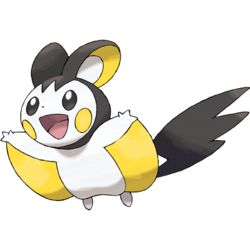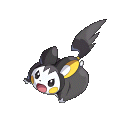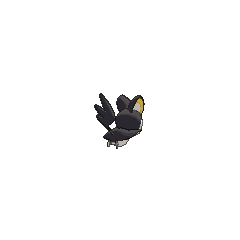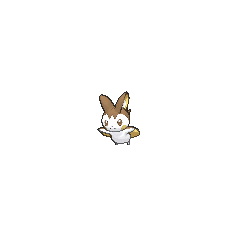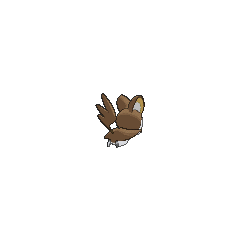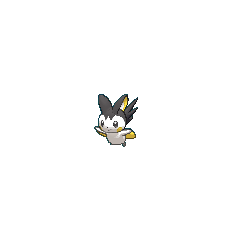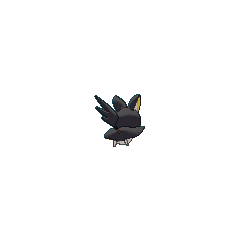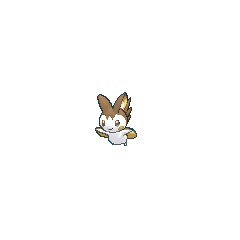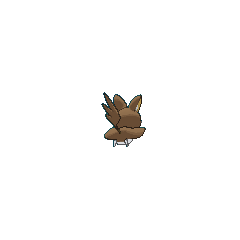Emolga (Japanese: エモンガ Emonga) is a dual-type Electric/Flying Pokémon introduced in Generation V.
It is not known to evolve into or from any other Pokémon.
Biology
Emolga is a white, rodent-like Pokémon resembling a flying squirrel. It has black eyes, a tiny nose, and yellow cheek patches. It can create electricity on the electric sacs located on its cheeks and store electricity inside its membranes. Its ears, positioned at the top of its head, are rounded in shape and black in coloration, with yellow and white sections of coloration in the inside of its ears. It sports a vaguely hood-like patterning of black around its head, with a spiky extension of the pattern above its face. It has yellow winglike flaps connected to its three-fingered arms. Its feet are white and fairly small and its black tail is in a jagged shape.
Emolga lives in treetops, sometimes in holes gouged by Pikipek, and uses its flaps to glide from tree to tree. It generates electricity in its cheeks, stores it in its membrane, and discharges it while gliding. It does this in order to be able to scare off bird Pokémon, giving Emolga the capability to gather lots of food. It then grills its food, being berries or bug Pokémon, with electric shocks to eat.
In the anime
In the main series
Major appearances
Emolga debuted in Emolga the Irresistible!, when a female Emolga was caught by Iris. She was manipulative, lazy, and gluttonous, though also good-hearted.
Other
Elesa used an Emolga in Dazzling the Nimbasa Gym!. Emolga was the second Pokémon Elesa used in a Gym battle against Ash. It was able to defeat his Palpitoad and Snivy before losing to Pikachu.
Minor appearances
An Emolga made a cameo appearance in Cilan Takes Flight!.
An Emolga appeared in Crisis at Ferroseed Research!.
An Emolga appeared in Lumiose City Pursuit!.
A few Emolga appeared in Diancie and the Cocoon of Destruction.
Multiple Emolga appeared in The Future Is Now, Thanks to Determination!, where they were among the Electric-type Pokémon being controlled by Team Rocket.
A Trainer's Emolga appeared in A Relay in the Sky!, where it was seen competing in the Pokémon Sky Relay. It was in a team also consisting of Swanna and Honchkrow.
An Emolga appeared in Party Dancecapades!, under the ownership of a Pokémon Performer attending Monsieur Pierre's dance party.
A Trainer's Emolga appeared in The First Day of the Rest of Your Life!.
A Trainer's Emolga appeared in Alola to New Adventure!.
Three Trainers' Emolga appeared in A Shocking Grocery Run!.
An Emolga appeared in Lillie's Egg-xhilarating Challenge!, where it was among the Pokémon playing in Lillie's garden.
A Trainer's Emolga appeared in They Might Not Be Giants!.
A Trainer's Emolga appeared in Balloons, Brionne, and Belligerence!.
Two Emolga appeared in Getting a Jump on the Competition!, with one under the ownership of a Sky Trainer and the other under the ownership of another Trainer. The Emolga belonging to the Sky Trainer was seen participating in the PokéSled Jump Tournament.
Pokédex entries
| Episode
|
Pokémon
|
Source
|
Entry
|
| BW024
|
Emolga
|
Ash's Pokédex
|
Emolga, the Sky Squirrel Pokémon. Emolga lives in trees and uses its cape-like membrane to glide through the air.
|
|
In the Pokémon Black 2 and White 2 Animated Trailer

Emolga in the animated trailer
An Emolga appeared in the Pokémon Black Version 2 and Pokémon White Version 2 Animated Trailer, under the ownership of Elesa.
In the manga
In the Be the Best! Pokémon B+W manga
In The Battle for More Friends!, Monta captured one using his Snivy.
In the Pokémon RéBURST manga
An Emolga appears as the Burst form of Pikke.
In the Pokémon Adventures manga
An Emolga appeared in a fantasy in Battle at the Museum.
A Trainer's Emolga appeared in Defeating Stoutland.
Elesa owns two Emolga as seen in To Make a Musical, where she was dressing up her Zebstrika in preparation of the Pokémon Musical. One of them was used later in a Gym Battle with Black.
Multiple Emolga were among the Electric-type Pokémon that charges the Prism Tower during a blackout in Pangoro Poses a Problem.
In the Pokémon Pocket Monsters manga
Elesa owns an Emolga in Pocket Monsters BW.
In the TCG
- Main article: Emolga (TCG)
Other appearances
Emolga appears in the background of the Prism Tower stage in the 3DS version of the game.
Trophy information
If you heard someone talk about "a cute little rodent Pokémon with electric pouches in its cheeks," you'd probably think they meant Pikachu, but that description would fit Emolga, too! Much like Pikachu, Emolga is more than just a cute face. It glides down from treetops on its cape-like membranes to really shock its foes!
Game data
NPC appearances
Pokédex entries
| This Pokémon was unavailable prior to Generation V.
|
| Generation V
|
|
| Black
|
The energy made in its cheeks' electric pouches is stored inside its membranes and released while it is gliding.
|
| White
|
They live on treetops and glide using the inside of a cape-like membrane while discharging electricity.
|
| Black 2
|
It glides on its outstretched membrane while shocking foes with the electricity stored in the pouches on its cheeks.
|
| White 2
|
|
|
| Generation VI
|
|
| X
|
They live on treetops and glide using the inside of a cape-like membrane while discharging electricity.
|
| Y
|
The energy made in its cheeks' electric pouches is stored inside its membranes and released while it is gliding.
|
| Omega Ruby
|
They live on treetops and glide using the inside of a cape-like membrane while discharging electricity.
|
| Alpha Sapphire
|
The energy made in its cheeks' electric pouches is stored inside its membrane and released while it is gliding.
|
|
|
| Generation VII
|
|
| Sun
|
It glides using its cape-like membrane. Electrical energy scatters from it, shocking its friends and foes alike.
|
| Moon
|
It grills berries and bug Pokémon with electric shocks and makes a meal of them. It usually nests in the holes gouged in trees by Pikipek.
|
| Ultra Sun
|
They store up electricity to fly through the air. When thunder cracks at night, sometimes there are almost enough of them to blot out the sky.
|
| Ultra Moon
|
As it flies, it scatters electricity around, so bird Pokémon keep their distance. That's why Emolga can keep all its food to itself.
|
|
|
Game locations
| This Pokémon was unavailable prior to Generation V.
|
| Generation V
|
|
| Black
|
White
|
Routes 5, 6, 7, 9, 10, 11, 12, 13, 14, 15, and 16, Dragonspiral Tower, Village Bridge, Giant Chasm, Abundant Shrine, Lostlorn Forest (rustling grass)
Trade Boldore on Route 7
|
|
| Black 2
|
White 2
|
| Routes 5, 6, 7, 9, 11, 12, 13, 14, 15, 16, 22, and 23, Dragonspiral Tower, Village Bridge, Abundant Shrine, Lostlorn Forest (rustling grass)
|
|
| Dream World
|
|
|
|
|
|
|
|
In side games
| This Pokémon was unavailable prior to Generation V.
|
|
|
|
|
Held items
In-game trades
Stats
Base stats
| Stat
|
Range
|
| At Lv. 50
|
At Lv. 100
|
55
|
|
115 - 162
|
220 - 314
|
75
|
|
72 - 139
|
139 - 273
|
60
|
|
58 - 123
|
112 - 240
|
75
|
|
72 - 139
|
139 - 273
|
60
|
|
58 - 123
|
112 - 240
|
103
|
|
97 - 170
|
189 - 335
|
Total: 428
|
Other Pokémon with this total
|
- Minimum stats are calculated with 0 EVs, IVs of 0, and (if applicable) a hindering nature.
- Maximum stats are calculated with 252 EVs, IVs of 31, and (if applicable) a helpful nature.
|
Type effectiveness
| Under normal battle conditions in Generation IX, this Pokémon is:
|
|
|
|
|
|
|
|
|
|
|
|
|
Learnset
|
|
|
|
- Bold indicates a move that gets STAB when used by Emolga
- Italic indicates a move that gets STAB only when used by an Evolution of Emolga
- Click on the generation numbers at the top to see level-up moves from other generations
|
|
|
|
|
- Bold indicates a move that gets STAB when used by Emolga
- Italic indicates a move that gets STAB only when used by an Evolution of Emolga
- Click on the generation numbers at the top to see TM moves from other generations
|
|
|
|
|
- Moves marked with an asterisk (*) must be chain bred onto Emolga in Generation VII
- Moves marked with a double dagger (‡) can only be bred from a Pokémon who learned the move in an earlier generation.
- Moves marked with a superscript game abbreviation can only be bred onto Emolga in that game.
- Bold indicates a move that gets STAB when used by Emolga
- Italic indicates a move that gets STAB only when used by an Evolution of Emolga
- Click on the generation numbers at the top to see Egg moves from other generations
|
|
|
|
|
- A black or white abbreviation in a colored box indicates that Emolga can be tutored the move in that game
- A colored abbreviation in a white box indicates that Emolga cannot be tutored the move in that game
- Bold indicates a move that gets STAB when used by Emolga
- Italic indicates a move that gets STAB only when used by an Evolution of Emolga
- Click on the generation numbers at the top to see Move Tutor moves from other generations
|
TCG-only moves
Side game data
|
|
PokéPark 2: Wonders Beyond

|
| PokéPark Pad entry:
|
| He likes to ride on the wind, but he also loves the thrill of Hide-and-Seek. He cannot help looking for hiding places while he is flying.
|
|
|
|
|
|
|
|
Evolution
Sprites
| This Pokémon was unavailable prior to Generation V.
|
|
|
|
|
|
|
Trivia
- Emolga was first seen in an image on August 7, 2010.[citation needed]
- Emolga is the only Pokémon with a base stat total of 428.
Origin
Emolga appears to be based on the Japanese dwarf flying squirrel and possibly the feathertail glider.
Name origin
Emolga is a corruption of Emonga.
Emonga may be a combination of 衣紋 emon (drapery/clothes/dress, referring to its patagium) and モモンガ momonga (scientific name of the Japanese dwarf flying squirrel).
In other languages
| Language
|
Title
|
Meaning
|
 Japanese Japanese
|
エモンガ Emonga
|
From 衣紋 emon and Pteromys momonga, the Japanese dwarf flying squirrel
|
 French French
|
Emolga
|
Same as English name
|
 Spanish Spanish
|
Emolga
|
Same as English name
|
 German German
|
Emolga
|
Same as English name
|
 Italian Italian
|
Emolga
|
Same as English name
|
 Korean Korean
|
에몽가 Emonga
|
Transliteration of Japanese name
|
 Mandarin Chinese Mandarin Chinese
|
導電飛鼠 / 导电飞鼠 Dǎodiànfēishǔ
|
From 導電 dǎodiàn and 飛鼠 fēishǔ
|
 Cantonese Chinese Cantonese Chinese
|
|
|
|
|
|
| More languages
|
 Russian Russian
|
Эмолга Emolga
|
Transcription of English name
|
 Serbian Serbian
|
Imolga
|
From English name
|
|
|
|
Related articles
External links

|
This Pokémon article is part of Project Pokédex, a Bulbapedia project that aims to write comprehensive articles on each Pokémon species, as well as Pokémon groups and forms.
|


 For other sprites and images, please see Emolga images on the Bulbagarden Archives.
For other sprites and images, please see Emolga images on the Bulbagarden Archives.
